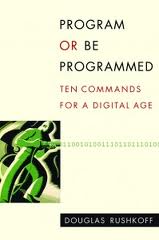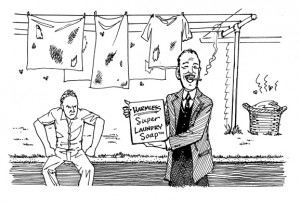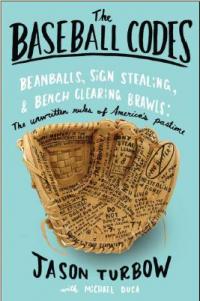Douglas Rushkoff: Program or be Programmed
January 11, 2011 by David
Filed under Non-Fiction, WritersCast
 978-1935928157 – Paperback – OR Books – $16.00 (ebook edition $10.00)
978-1935928157 – Paperback – OR Books – $16.00 (ebook edition $10.00)
with terrific original illustrations by Leland Purvis.
I think this book, Program or be Programmed: Ten Commands for a Digital Age by digital critic and thinker Douglas Rushkoff, should be required reading for anyone interested in modern culture, politics or economics. It’s a short book, densely argued, that requires careful reading and attention to its ideas. Which probably makes it daunting to many in this era of fragmented ideas and short subjects. But it’s divided into ten clear sections (note “commands” as in programming inputs, rather than “commandments” as in biblical instructions) and is well worth the effort a reader must put into reading it.
I spent more time with this short book than with many much longer books I have read recently. And I am very happy I did. As Howard Rheingold says “Thinking twice about our use of digital media, what our practices are doing to us, and what we are doing to each other, is one of the most important priorities people have today.” It’s impossible not to agree. And Rushkoff understands the complexity of behavior and thinking that the always-on, always-connected internet has brought to modern culture.
It’s not about whether the internet is good or bad, or whether online culture somehow supplants a more preferable offline one. As the publisher says about this book, “the real question is, do we direct technology, or do we let ourselves be directed by it and those who have mastered it? “Choose the former,” writes Rushkoff, “and you gain access to the control panel of civilization. Choose the latter, and it could be the last real choice you get to make.”
Having the opportunity to talk about these ideas with Rushkoff was tremendously exciting and invigorating. He’s a really smart guy whose clarity of thought I admire alot. I’ve spent alot of time participating in, reading about and analyzing new media and modern culture myself, and I know I have learned alot from Douglas Rushkoff’s books and ideas. I think Program or be Programmed is one of the most important books I have read in a long time.
Podcast: Play in new window | Download
Jason Turbow and Michael Duca: The Baseball Codes
July 22, 2010 by David
Filed under Non-Fiction, WritersCast
 978-0375424694 – Random House – $25.00 (e-book editions also available at $9.99)
978-0375424694 – Random House – $25.00 (e-book editions also available at $9.99)
The subtitle of this book is long but tells you why almost any baseball fan (and some cultural anthropologists and sociologists) will be interested in this book: “Beanballs, Sign Stealing, & Bench Clearing Brawls: The Unwritten Rules of America’s Pastime.”
This is both an entertaining and fun read. It will work for serious fans of course, but just as well for more desultory followers of baseball, and really even readers who only have a passing interest in baseball. The basic notion is that baseball has had unwritten codes of conduct covering all sorts of on and off field behavior, probably for as long as the game as been played professionally. In years past, it would have been unusual for anyone outside of the closed professional baseball fraternity and maybe the regular baseball writers and broadcasters to know the details of how “the code” works.
The code is really a set of home grown rules, in some instances expressing sportsmanship, in other instances expressing the underlying social (and economic) values between players and teams. It is really fascinating to think about just how comprehensive human beings are in creating ad hoc systems of governance. The formal rules of the game, enforced by team owners, leagues and ultimately the Commissioner of baseball are written down and codified, as are the contracts between players and teams. The day to day rules of behavior among players, of course, are unwritten, passed on from one generation to the next, and highly subject to interpretation, ongoing disagreement and of course the change in social mores and behavior in the overall culture as well.
To write this book, Turbow and Duca spent a great deal of time talking with former and current players, coaches and managers. They are able to report back about the code, past and present, but the richness of the book lies in their many anecdotal examples of its application. And of course how the code has actually changed over the years as baseball and its players have changed is another theme of the book.
The Baseball Codes express and amplify not only the great Game of Baseball itself, but the richness of human culture and its history. This book was alot of fun for me to read, I knew some of the stories, but there were many more that were new to me, or which, by hearing the players talk about them, enabled me to understand much better what I knew about some of the interesting events in baseball history. Talking to co-author Jason Turbow was also great fun. He’s a passionate observer of the sport of baseball, and knows how to tell great stories. It’s the middle of the 2010 baseball season as this interview is posted, and a great time to listen to some baseball lore. And the Jason maintains an active blog that will keep fans up to date on current code behavior, also fun and recommended.
Podcast: Play in new window | Download
